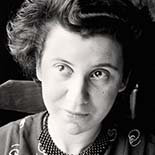 Esther (Etty) Hillesum (January 15, 1914 – November 30, 1943) was the Dutch author of confessional letters and diaries which describe both her religious awakening and the persecutions of Jewish people in Amsterdam during the German occupation. In 1943, she was deported and murdered in Auschwitz concentration camp.
Esther (Etty) Hillesum (January 15, 1914 – November 30, 1943) was the Dutch author of confessional letters and diaries which describe both her religious awakening and the persecutions of Jewish people in Amsterdam during the German occupation. In 1943, she was deported and murdered in Auschwitz concentration camp.
Etty Hillesum began writing her diary in March 1941, possibly at the suggestion of her analyst Julius Spier, whom she had been consulting for a month. Although his patient, Etty also became his secretary, friend, and, eventually, his lover. His influence on her spiritual development is apparent in her diaries; as well as teaching her how to deal with her depressive and egocentric episodes he introduced her to the Bible and St. Augustine and helped her develop a deeper understanding of the work of Rilke and Dostoyevsky.
Her diaries record the increasing anti-Jewish measures imposed by the occupying German army, and the growing uncertainty about the fate of fellow Jews who had been deported by them. As well as forming a record of oppression, her diaries describe her spiritual development and deepening faith in God.
When round-ups of Jews intensified in July 1942, she took on administrative duties for the Jewish Council, voluntarily transferring to a department of “Social Welfare for People in Transit” at Westerbork transit camp. She worked there for a month, but returned in June 1943, by which time she had refused offers to go into hiding in the belief that her duty was to support others scheduled to be transported from Westerbork to the concentration camps in German-occupied Poland and Germany. On July 5, 1943, her personal status was suddenly revoked and she became a camp internee along with her father, mother, and brother Mischa.
Russian authors and Christian mystics likely contributed to Hillesum’s understanding of spirituality. She did not strive for ecstasy, but longed to meet the depth of her own interior and life itself. Her spirituality was not confined to her intellectual understanding of a greater power and is reflected in her diaries. In the concentration camp of Westerbork, she had unusual experiences of spiritual awakenings and insight: “Those two months behind barbed wire have been the two richest and most intense months of my life, in which my highest values were so deeply confirmed. I have learnt to love Westerbork”
Hillesum suffers great inner turmoil during her young adulthood, but increasingly transforms into a woman of maturity and wisdom. She writes: “Everywhere things are both very good and very bad at the same time. The two are in balance, everywhere and always. I never have the feeling that I have got to make the best of things; everything is fine just as it is. Every situation, however miserable, is complete in itself and contains the good as well as the bad.” In touch with the equilibrium of a bigger picture she is aware of, she continuously draws from this place to find meaning in her current reality. On September 7, 1943, less than 3 months before her murder, she threw a postcard with her final words out of a train: “Opening the Bible at random I find this: ‘The Lord is my high tower’. I am sitting on my rucksack in the middle of a full freight car. Father, Mother, and Mischa are a few cars away. In the end, the departure came without warning…. We left the camp singing…. Thank you for all your kindness and care.”